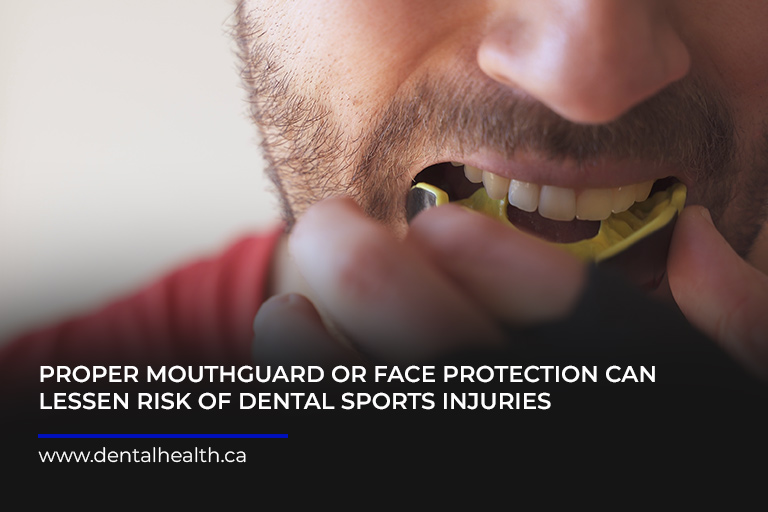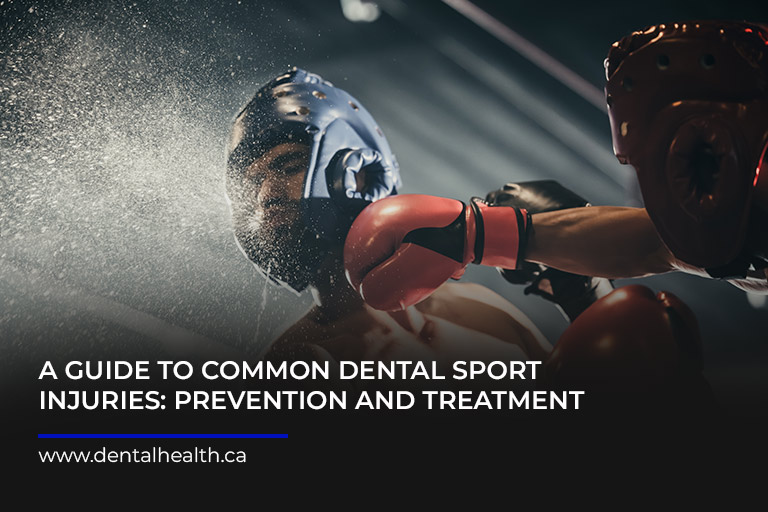Engaging in sports brings joy, fitness, and camaraderie, but it also comes with the risk of dental injuries. Statistics reveal that a significant proportion of dental traumas occur during sports activities, impacting athletes of all ages and skill levels. The Canadian Dental Association emphasizes the need for awareness and preventive measures to safeguard oral health. This comprehensive guide delves into the various types of dental sport injuries, their underlying causes, and effective strategies for prevention and treatment, ensuring that your active lifestyle doesn’t compromise your radiant smile.
Types of Common Dental Sport Injuries
Dental sport injuries encompass a wide range of traumas, each requiring specific attention and care:
- Crown Fractures: These injuries affect the visible part of the tooth, ranging from small chips to significant breaks that may expose the sensitive inner pulp, causing pain and increasing the risk of infection.
- Root Fractures: Occurring below the gum line, these fractures involve damage to the tooth’s root. Often complex and requiring specialized treatment, root fractures can jeopardize the tooth’s long-term viability.
- Luxations: These encompass a spectrum of tooth displacement from its socket, from minor loosening (subluxation) to partial displacement (extrusion or intrusion) and even complete dislodgment (avulsion), posing challenges for restoration and reimplantation.
- Alveolar Fractures: These fractures involve the bony socket that anchors the tooth, frequently occurring alongside luxations or avulsions. They demand careful management to ensure proper healing and restore the tooth’s stability.
- Soft Tissue Injuries: Impact or contact with equipment can lead to cuts, tears, or bruising of the soft tissues in the mouth, including the lips, cheeks, gums, or tongue. These injuries require appropriate care to prevent infection and promote optimal healing.
- Jaw Fractures: Resulting from severe impacts, jaw fractures involve breaks in the jawbone. These serious injuries necessitate immediate medical attention, often involving surgical intervention to realign and stabilize the fractured segments.
- Temporomandibular Joint (TMJ) Injuries: The TMJ, a complex joint connecting the jawbone to the skull, can be injured or dislocated due to trauma, leading to pain, limited jaw movement, clicking or popping sounds, and potential long-term dysfunction.
- Dental Concussions: Similar to concussions affecting the brain, dental concussions involve trauma to the tooth’s supporting structures without visible damage. These injuries can cause sensitivity, pain, and potentially long-term complications if left unaddressed.
Causes of Dental Sport Injuries

Understanding the causes of dental sport injuries is crucial for developing effective preventive strategies:
- Direct Impact: Forceful collisions with opponents, equipment, or the ground can result in a wide spectrum of dental injuries, ranging from minor chips and cracks to complete tooth fractures or avulsions. Additionally, the impact can dislodge teeth from their sockets or even fracture the jawbone.
- Projectile Impact: High-velocity projectiles like balls, pucks, or racquets can forcefully strike the mouth, causing significant dental trauma. These impacts can lead to tooth avulsions, root fractures, extensive crown fractures, and severe lacerations to the lips, gums, or cheeks
- Falls and Accidents: Unexpected falls or accidents during sports can result in a variety of dental injuries. The impact can cause teeth to fracture at the gum line, break into multiple pieces, or become intruded into the jawbone. Facial abrasions and lacerations are also common consequences.
- Lack of Protective Gear: Failing to wear a mouthguard or appropriate face protection significantly increases the risk of dental injuries from impacts and collisions. Without this protective barrier, teeth are directly exposed to forceful blows, leading to fractures, dislocations, and other forms of trauma.
- Pre-existing Conditions: Athletes with weakened teeth due to decay, previous dental work, or orthodontic appliances are more susceptible to dental damage during sports. The existing vulnerabilities make teeth more prone to fractures, loosening, or even complete avulsion upon impact.
- High-Risk Sports: Contact and collision sports, such as hockey, rugby, and boxing, naturally carry a higher risk of dental injuries due to the frequent physical contact and forceful impacts involved in these activities. Even with protective gear, the intensity of these sports can lead to dental trauma.
Prevention
Preventing dental sport injuries should be a priority for every athlete, coach, and parent. Here are key preventive measures:
- Mouthguards: Opt for custom-fitted mouthguards for optimal protection, as they are designed to absorb shock effectively and distribute impact forces, significantly reducing the risk of dental injuries.
- Face Shields and Helmets: In sports where applicable, face shields and helmets act as a crucial barrier, providing extra protection to the teeth, mouth, and face from potential impact and collisions.
- Rule Enforcement: Stringent enforcement of rules against dangerous play and fostering a culture of fair play in sports can significantly contribute to a decrease in the frequency and severity of dental and other injuries.
- Proper Technique: Equipping athletes with comprehensive training in proper techniques and safe practices specific to their sport can help minimize the risk of collisions, falls, and subsequent dental injuries.
- Regular Dental Check-ups: Prioritize routine dental examinations to maintain optimal oral health, as this proactive approach allows for early identification and treatment of any pre-existing dental conditions that might increase vulnerability to injuries.
What to Do After the Injury

Swift and appropriate action after a dental sports injury can significantly impact recovery and long-term oral health. Here’s what to do in various scenarios:
- Locate the Injured Tooth: If a tooth has been knocked out or fractured, carefully locate the tooth fragment or the entire tooth. Avoid touching the root, if possible, as this can damage the tooth’s delicate tissues.
- Preserve the Tooth: For avulsed teeth (completely dislodged from the socket), attempt immediate re-implantation if possible. If re-implantation is not feasible, store the tooth in milk or saliva to keep it moist and prevent damage to the root. Seek urgent dental attention as soon as possible.
- Control Bleeding: Apply gentle pressure to the affected area using a clean cloth or gauze pad to control any bleeding from the mouth or gums. Avoid excessive pressure, as this can damage the tissues further.
- Reduce Swelling: Apply a cold compress to the outside of the affected area to help minimize swelling and reduce discomfort. Wrap the ice pack in a cloth to protect the skin.
- Seek Professional Help: Regardless of the severity of the dental injury, it is important to consult a dentist as soon as possible for proper assessment and treatment. Prompt attention can help prevent complications and ensure optimal healing.
Safeguarding your smile during sports activities is an investment in your overall well-being. By prioritizing prevention, wearing appropriate protective gear, and seeking prompt treatment when needed, you can maintain optimal oral health and continue enjoying your favourite sports without hesitation.
For expert guidance and comprehensive dental care, contact Kingsway Family Dentistry at (905) 563-4001. Our team is committed to helping you achieve and maintain a healthy, confident smile, whether you’re on the field or off.

